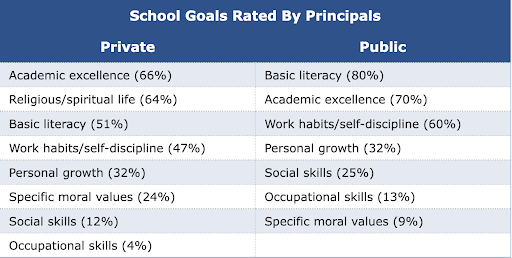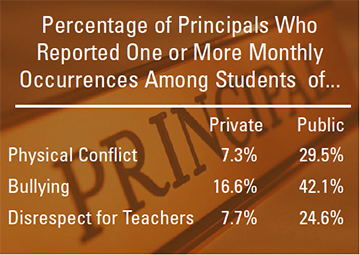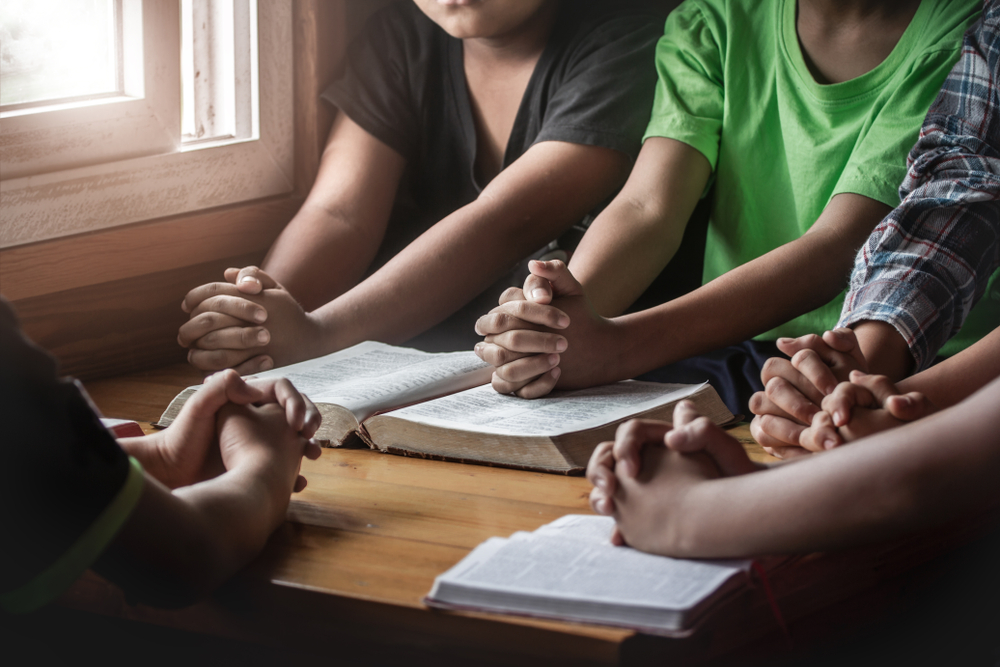Private schools focus on the essentials–that which provides purpose and meaning to life.
The sad reality is that our society is marked by a great fear that fundamental values are coming undone. Within that context, a growing number of parents desperately desire the opportunity to choose schools whose primary purpose is to provide youngsters a sound moral and religious education. Private schools are the only schools we have that can assist parents with the religious and spiritual development of their children–a sphere of development so essential for their complete and proper upbringing.
The 1999-2000 Schools and Staffing Survey asked school principals to rate various goals as their most important. Below is the rank order of goals rated by principals of public schools and private schools, with the percentage of principals ranking each goal as their first, second, or third most important (Public school principals were not asked about the goal of religious/spiritual development.)

Morally-focused Teachers
Henry Adams once said, “A teacher affects eternity.” Teachers in private schools profoundly appreciate the eternal dimensions of their work, for they nourish not only the minds but also the hearts and souls of their students. Serving in schools that emphasize a child’s complete development, private school teachers have the privileged opportunity to transmit the core academic skills as well as the lessons that count most in life: lessons about spirituality, love, values, the wonder of creation, the purpose of existence. Can any work be more important?
Indeed, the work of the private school teacher is of such significance, it is often regarded as a ministry and a calling, rather than just a job. Patty Quinn, a teacher at a private school in Maryland, described it this way: “I look at this job as a vocation, not as a career. I really think that the work that I’m doing has eternal consequences.” (Education Week, March 29, 2000)
Private schools are wonderful places in which to teach. They offer caring, orderly, safe, and nurturing environments; they emphasize the education of the whole child; they insist on academic excellence; and they treat teachers as professionals, giving them considerable autonomy and independence in matters of instruction. The disciplined environment, rigorous curriculum, caring communities, and high expectations private schools provide make them some of the most effective schools in the country. Teachers in private schools can spend their time doing what they are supposed to be doing: teaching.
A century ago, many parents counted on schools to help rescue their children from the terrible shadow of poverty. Today, a new generation of children needs deliverance from a far more crushing poverty, a poverty of spirit. In an age which sometimes seems so void of basic values, an age where children are coarsened by the media and numbed by nihilism, parents are calling on private schools to help them infuse their children’s lives with purpose and meaning. They desperately want teachers who can enliven the mind as well as the heart; teachers who can call youngsters to a life of service and love; teachers who can not only teach children to read and write, but also to tell right from wrong.
More Respect. Less Bullying.
Two related federal surveys of school administrators offer fresh insight into the working conditions that principals face on a day-to-day basis.
One survey shows that principals in private schools report far fewer instances than public school principals of physical conflict among students, bullying, and acts of disrespect against teachers.

Discover a host of other interesting findings from the surveys in this issue of CAPE Outlook.

